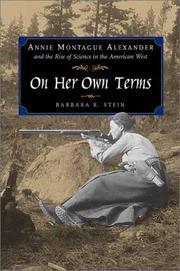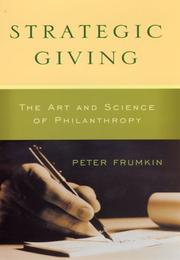| Listing 1 - 4 of 4 |
Sort by
|
Book
Year: 1836 Publisher: Cincinnati : [s.n.],
Abstract | Keywords | Export | Availability | Bookmark
 Loading...
Loading...Choose an application
- Reference Manager
- EndNote
- RefWorks (Direct export to RefWorks)
Slavery --- Philanthropist (New Richmond, Ohio) --- Cincinnati (Ohio) --- History.

ISBN: 1282356259 0520926382 9786612356254 1597347817 9780520926387 0520227263 9780520227262 9781282356252 Year: 2001 Publisher: Berkeley University of California Press
Abstract | Keywords | Export | Availability | Bookmark
 Loading...
Loading...Choose an application
- Reference Manager
- EndNote
- RefWorks (Direct export to RefWorks)
At a time when women could not vote and very few were involved in the world outside the home, Annie Montague Alexander (1867-1950) was an intrepid explorer, amateur naturalist, skilled markswoman, philanthropist, farmer, and founder and patron of two natural history museums at the University of California, Berkeley. Barbara R. Stein presents a luminous portrait of this remarkable woman, a pioneer who helped shape the world of science in California, yet whose name has been little known until now. Alexander's father founded a Hawaiian sugar empire, and his great wealth afforded his adventurous daughter the opportunity to pursue her many interests. Stein portrays Alexander as a complex, intelligent, woman who--despite her frail appearance--was determined to achieve something with her life. Along with Louise Kellogg, her partner of forty years, Alexander collected thousands of animal, plant, and fossil specimens throughout western North America. Their collections serve as an invaluable record of the flora and fauna that were beginning to disappear as the West succumbed to spiraling population growth, urbanization, and agricultural development. Today at least seventeen taxa are named for Alexander, and several others honor Kellogg, who continued to make field trips after Alexander's death. Alexander's dealings with scientists and her encouragement--and funding--of women to do field research earned her much admiration, even from those with whom she clashed. Stein's extensive use of archival material, including excerpts from correspondence and diaries, allows us to see Annie Alexander as a keen observer of human nature who loved women and believed in their capabilities. Her legacy endures in the fields of zoology and paleontology and also in the lives of women who seek to follow their own star to the fullest degree possible.
Zoologists --- Alexander, Annie Montague, --- Science --- Alexander, Annie Montague --- anno 1800-1899 --- anno 1900-1999 --- United States --- adventure. --- american west. --- annie montague alexander. --- berkeley. --- biography. --- california. --- conservation. --- environment. --- explorer. --- extinction. --- female scientists. --- feminism. --- field research. --- fossils. --- gender. --- hawaii. --- historical women. --- history. --- lesbian. --- lgbt. --- lgbtqia. --- louise kellogg. --- markswoman. --- natural history museum. --- naturalist. --- nonfiction. --- old west. --- paleontology. --- philanthropist. --- pioneer. --- radical women. --- sugar empire. --- the west. --- travel. --- urbanization. --- women and science. --- women in history. --- women in science. --- women in stem. --- womens studies. --- zoology. --- United States of America --- Biography --- Book
Book
ISBN: 1526139006 1526129132 9781526129130 9781526129147 1526129140 1526129124 9781526129123 Year: 2018 Publisher: Manchester
Abstract | Keywords | Export | Availability | Bookmark
 Loading...
Loading...Choose an application
- Reference Manager
- EndNote
- RefWorks (Direct export to RefWorks)
"This is the first biography of Thomas Harris. Until now, little has been known about his life. He was most visible as the man who controlled Covent Garden theatre for nearly five decades, one of only two venues in London allowed by law to perform spoken drama. But this career was only one of many: he became the confidant of George III, a philanthropist, sexual suspect, and a brothel owner in the underworld of Covent Garden. While deeply involved in Pitt the Younger's government, Harris worked as a 'spin doctor' to control the release of government news. As novelists created elaborate storylines with fictional intriguers lurking in the shadows, Harris was the real thing. In this lively recreation of life in Georgian London - social, political, sexual, theatrical - his career intersects many of the hidden worlds of the eighteenth century. This narrative of detection brings together a hoard of newly discovered manuscripts to construct his many lives." -- Publisher.
Theatrical managers --- Managers, Theatrical --- Theater managers --- Theater management --- Harris, Thomas, --- Harris, T. --- Covent Garden Theatre --- Royal Italian Opera (London, England) --- Theatre Royal, Covent Garden --- History. --- London (England) --- Social life and customs --- Biography. --- Theatrical managers. --- Biographies --- History --- Life histories --- Memoirs --- Auxiliary sciences of history --- Genealogy --- Covent Garden Theatre. --- England --- England and Wales --- Angleterre --- Anglii︠a︡ --- Inghilterra --- Engeland --- Inglaterra --- Anglija --- Theatre Studies --- Literature: History & Criticism --- LITERARY CRITICISM / Modern / 18th Century --- Covent Garden theatre. --- Secret Service. --- Thomas Harris. --- eighteenth-century London. --- government news. --- philanthropist. --- radicalism. --- sexual suspect. --- theatre management.

ISBN: 9780226266268 0226266265 9786611956837 128195683X 0226266281 9780226266282 9781281956835 Year: 2006 Publisher: Chicago : University of Chicago Press,
Abstract | Keywords | Export | Availability | Bookmark
 Loading...
Loading...Choose an application
- Reference Manager
- EndNote
- RefWorks (Direct export to RefWorks)
The philanthropic landscape is changing dramatically as a new generation of wealthy donors seeks to leave its mark on the public sphere. Peter Frumkin reveals in Strategic Giving why these donors could benefit from having a comprehensive plan to guide their giving. And with this thoughtful and timely book, he provides the much-needed framework to understand and develop this kind of philanthropic strategy. After listening for years to scores of individual and institutional funders discuss the challenges of giving wisely, Frumkin argues here that contemporary philanthropy requires a thorough rethinking of its underlying logic. Philanthropy should be seen, he contends, as both a powerful way to meet public needs and a meaningful way to express private beliefs and commitments. He demonstrates that finding a way to simultaneously fulfill both of these functions is crucial to the survival of philanthropy and its potential to support pluralism in society. And he goes on to identify the five essential elements donors must consider when developing a philanthropic strategy-the vehicle through which giving will flow, the way impact will be achieved, the level of engagement and profile sought, the time frame for giving, and the underlying purpose of the gift. Frumkin's point is that donors must understand strategic giving as the integration of these five critical dimensions to giving. Essential reading for donors, researchers, and anyone involved with the world of philanthropy, Strategic Giving provides a new basis for understanding philanthropic effectiveness and a promising new way for philanthropy to achieve the legitimacy that has at times eluded it.
Associations sans but lucratif --- Philanthropes --- Dons aux oeuvres --- #SBIB:316.7C124 --- #SBIB:309H504 --- 316.64 --- Cultuursociologie: gebruiken, zeden en gewoonten --- Code en boodschap: sociologische, antropologische benadering --- Maatschappelijke attitudes --(sociale psychologie) --- Charities. --- Charities - United States. --- Nonprofit organizations - United States. --- Nonprofit organizations. --- Philanthropists. --- Philanthropists - Charitable contributions - United States. --- Management --- Business & Economics --- Industrial Management --- 316.64 Maatschappelijke attitudes --(sociale psychologie) --- Nonprofit organizations --- Charities --- Philanthropists --- Charitable contributions --- Altruists --- Humanitarians --- Corporations, Nonprofit --- Non-profit organizations --- Non-profit sector --- Non-profits --- Nonprofit sector --- Nonprofits --- Not-for-profit organizations --- NPOs --- Organizations, Nonprofit --- Tax-exempt organizations --- Benefactors --- Associations, institutions, etc. --- art, artistic, artist, science, philanthropist, giving, donations, mentor, benefactor, wealth, wealthy, donor, donation, strategy, philanthropic, funding, funder, institutional, individual, logic, needs, commitment, belief, morals, ethics, impact, gift, united states, charity, charities, professional, career, america, time frame, scale, leverage.
| Listing 1 - 4 of 4 |
Sort by
|

 Search
Search Feedback
Feedback About UniCat
About UniCat  Help
Help News
News